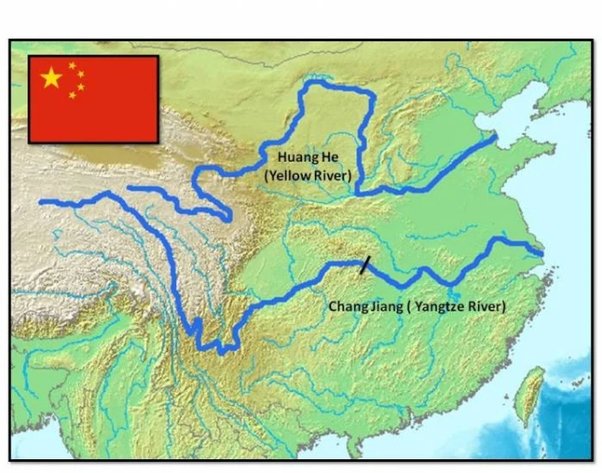Since yellow is a Chinese word,
“Yellow” isn’t a Chinese word. It’s English. It isn’t even derived from Chinese. If we look at the etymology, or word history, of “yellow”, you can clearly see that it isn’t a Chinese word. The word comes from the Old English “geolu” or “geolwe”. This, in turn came from the Saxon “gelo”. This Saxon word came from the Proto-Germanic “gelwaz”. If we continue to trace this word back, we get to the Proto-Indo-European root “*ghel-”, which actually means “shine” or “green/yellow”. Many other words we use today also have this origin, such as “gold”, “glow”, “glitter”, “glass”, etc.
Of course, like many languages, Chinese does have a word for “yellow”, and that word is 黄 (huáng). A good example of this is the name 黄河 (Huánghé), or “Yellow River”:

The Yellow River gets its name from the massive amount of silt in the river, deposited into the river from a mixture of the dry, arid lands upstream as well as silt from the Loess Plateau. The Loess Plateau is essentially a massive pile of dust that accumulated over a period of time somewhere between 20 million and 2 million years ago.


The word 黄 (huáng), meaning “yellow”, has another meaning in Chinese, in a similar way to how “yellow” can mean “coward” in English (e.g. “yellow-bellied”). The word 黄 (huáng), “yellow”, can mean that something is sexual, perverted, or otherwise “adult”. English uses a color to describe these things as well, although the use has slowly been dying out. Perhaps you’ve heard of “blue humor”.
what else is?
I tried to find some terms that English uses that come from Chinese, and although a few are dubious, such as the phrase “no can do” (being a literal translation of the Chinese 不能做 – bùnéng zuò), and a few are really obvious, such as bok choy (白菜 – pronounced in Cantonese as baak6 coi3), I found some that I think are pretty interesting.
First, here’s one that, upon reflection, makes sense. That said, I didn’t know that it came from World War Two, as China was fighting Japan. This term is “gung ho”. It comes from 工業合作社 (Gōngyè Hézuòshè), which means Industrial Cooperative, a system of industry infrastructure created during the war. This term gets shortened to 工合 (gōnghé) in Chinese, and literally means “work together”.
Next, there’s the word “ketchup”. Before ketchup was the tomato-based sauce that people use today, it was a mushroom or fish sauce (think umami taste – earthy and rich), often used as a cooking ingredient. The first known uses of this word in English are from around the year 1700, and have to do with the EIC (East India Company). Although people are not completely certain, it’s believed that this word come from 膎汁 (xié zhī), which roughly means “pickle juice” or “pickled seafood juice”. Now, the thing is that I left the pinyin, or Mandarin way of saying this word, but the Hokkien people, from eastern China is key here. The Hokkien in Fujian would pronounce this as “kôe-chiap”, while the Hokkien in the area of Guangzhou would’ve said “kê-chiap”.
Finally, the word “tycoon” comes from Chinese, although indirectly. It came immediately from archaic Japanese – the term 大君 (taikun), literally meaning “big monarch/leader”. Japanese actually got this term from China, via the I Ching (易經 – Yì Jīng – The Book of Changes). In this book, there’s a reference to an independent ruler not of the imperial lineage, and they used the term 大君 (Dà jūn) for it.